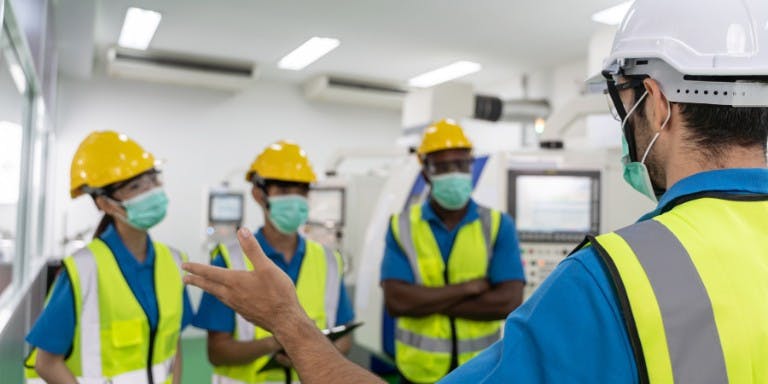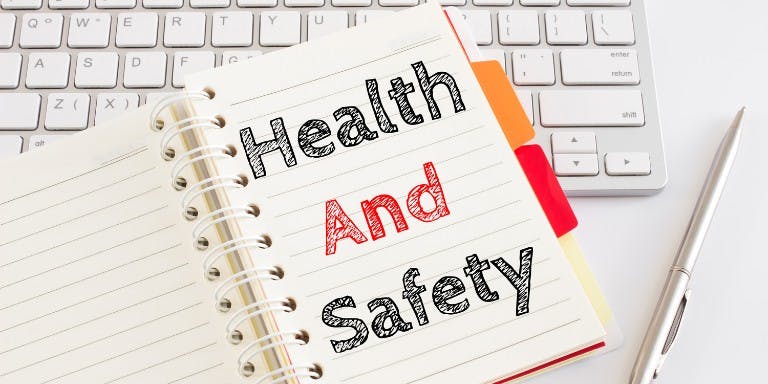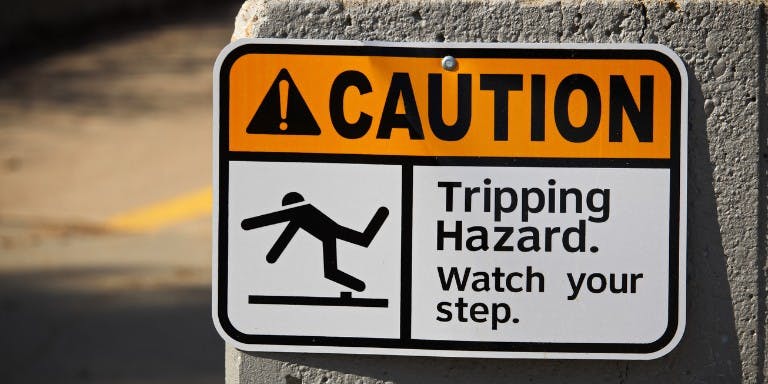First published on Thursday, December 19, 2024
Last updated on Thursday, December 19, 2024
Jump to section
Under UK legislation, employers in the UK have a legal responsibility to provide health and safety training to employees, no matter where they work or their role.
The Health and Safety at Work act 1974, specifies that you are required to ‘deliver information, equipment, and training to employees under your management.’ This helps to minimise risks in the workplace and ensures a safe workplace for all employees and visitors.
In this guide we explore the mandatory health and safety training you are legally required to provide employees with. Plus, different types of industry-specific training required for certain types of businesses and working environments.
Mandatory training courses
All health & safety training provided should be proportionate to the level of risk your employees are exposed to. This means conducting a risk assessment to identify the risks and hazards associated with your workplace and type of work.
Where a role is exposed to higher levels of risk, more training will be required for the employee to be considered competent for the role.
While there is no exhaustive list of specific training courses, the following are ones which cover the essential elements of health & safety:
Fire safety training
Display screen equipment (DSE)
First aid training
Manual handling
Risk assessments and management
Industry-specific health & safety training
Other training courses such as control of substances hazardous to health (COSHH) and asbestos awareness training may only be relevant to particular employees or those working in certain areas of a business or industry.
Industries with higher rates of accidents at work such as construction, manufacturing, transportation, and agriculture are usually exposed to more hazardous materials and equipment.
For example, in construction many employees will work at height or carry out regular heavy lifting. More detailed training courses focused on these specific risks will apply to those in certain industries.
There are also various training courses for staff who use specific work equipment. Such as lifting equipment, abrasive wheels, drills, and other types of equipment that may pose a risk.

Who needs health & safety training in the workplace?
Simply put—everyone. From mid-management to the directors, and all employees including temporary staff and remote workers should complete health & safety training.
Health & safety training should be provided from the first day of employment. Including this within your staff induction process, ensures every new member of the team has undertaken the same courses and understands how to maintain a safe workplace.
Ongoing training for continuous development
The law says that training must be given regularly, and when particular needs arise. This might include new processes, new recruits, people changing jobs or responsibilities, or updates to risk assessments. it’s important to keep up to date with the latest legislation. Updating your employees on changes to current HSE guidelines.
Certain types of training may need to be updated each year, so annual refreshes of your employee’s health & safety training will ensure you remain compliant and not at risk of failed audits of inspections.

Why is health & safety training so important?
Not only will health & safety training ensure your employees are safe at work, but it will also ensure you are compliant with the law.
Audits and inspections from the HSE are assessments of your business’ health & safety practices and protocols. Any non-compliances or unsafe practices identified could lead to huge financial penalties. On average, the cost of a court fine for breaching health and safety law is around £150,000. A cost most businesses in the UK would struggle to pay.
If an accident or injury occurs because of non-compliance with current H&S legislation, you may find yourself at risk of business closure, loss of company director status or even facing imprisonment.
Get access to regularly updated health & safety training with BrightSafe
As part of our BrightSafe health & safety management software, you will gain access to over 80 health & safety courses. With each course regularly updated and accredited by RoSPA and CPD, our health & safety online courses ensure your business is up to date on current health and safety legislation, mitigating risk of accidents and emergencies in your workplace and keeping your workforce safe.
Book your demo today to access a wide range of free e-learning courses.







